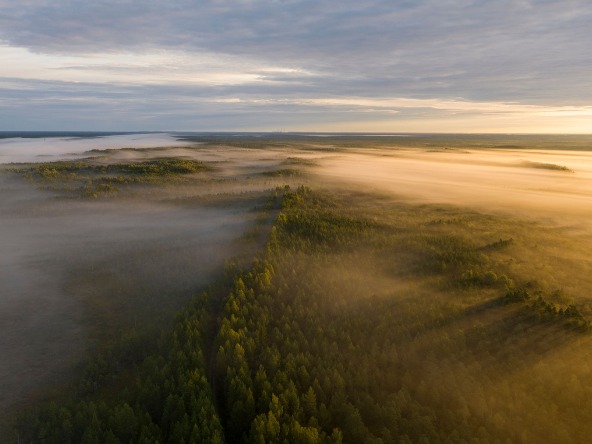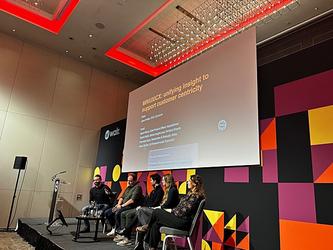How research helped in the battle to save Europe’s peatlands

When businesses and politicians discuss environmental protection and climate change, often the focus is on forests, planting trees, removing plastic waste from our seas and rivers or protecting the polar ice caps. It is rare the discussion focuses on peatlands.
And yet, as the 2024 Market Research Society (MRS) annual conference heard last month, peatlands are crucial in the battle against climate change. Campaign group Climate Catalyst and neuroscience research company Walnut Unlimited presented a project to raise awareness of and nix misguided perceptions about peatlands and learn how to communicate their importance to the European public and governments.
Peatlands are a type of wetland that is found in almost every country on earth, covering approximately 3% of land surface worldwide. Tierney Smith, head of communications at Climate Catalyst, told the conference that healthy peatlands “are a huge climate champion and have the potential to store twice as much carbon as all the world’s forests combined”, as well as benefits in helping to filter drinking water and protect against floods, droughts and wildfires.
However, drainage, mining for fuel and conversion to agricultural land has meant that peatlands are becoming over-exploited, according to Smith. Overexploited peatlands become a net producer of carbon, and their misuse is contributing to 5% of global carbon emissions.
The problem was engaging the public. “We faced a challenge when it comes to peatlands – peatlands aren’t sexy,” Smith explained. “For the majority of us, we don’t know what peatlands are, and when we do know what they are, we see them as bogs or swamps – these eerie foreboding landscapes that are to be feared.”
A second challenge was that peatlands are being turned over to agriculture, and in Europe, farming traditions have meant there is a powerful farming lobby present. This picture is further complicated by the cost-of-living crisis and war in Ukraine affecting food and energy security, which have helped feed alternative voices on the subject, even though healthy peatlands help food security. “We faced a twin challenge: how do we counter these dominant, opposing voices when ultimately not many people actually know what peatlands are,” Smith said.
“Peatlands don’t always have the best rep and don’t always have the best press,” added Nick Saxby, associate director at Walnut Unlimited. “But we tried to change their perceptions because we think they could be very powerful, and this had some good impact and showed where research could be useful.”
Walnut carried out a neuroscience project to help uncover ways to boost peatlands’ reputation and prominence among the public and policymakers. The project involved quantitative and qualitative work in Germany and Finland, and used implicit reaction time testing to work out what messaging was most successful. “Our main aim was to understand what would drive people to support peatlands more, what would motivate them to take action, and off the back of that we could understand what types of messages we should use,” Saxby added.
The team used samples of people who broadly care about climate change and provided participants with some background information on peatlands before carrying out the survey. The quantitative testing and implicit testing went beyond verbal declarations, with the team using an attitude accessibility paradigm, which they felt was a stronger guide of behaviour, as speed of response is important. Therefore, it was not just the answer provided that was measured, but the speed of which it was given.
A list of overarching themes was developed with support from peatland specialists and then tested to see which areas resonated most with the respondents. The themes included climate change mitigation; climate change resilience; clean water; support for wildlife; human benefits and impact on rural economies; and identity and heritage, as peatlands can be natural or archaeological wonders.
From people’s answers alone, climate change mitigation performed the best with 93% support. Saxby said the issue made the most sense on a rational level, once you consider that peatlands could hold double the CO2 as all the world’s forests combined.
However, implicit testing showed that the strongest performer was support for wildlife, with climate change mitigation dropping to the bottom. “Sometimes the facts and figures about climate change mitigation are not always the most motivating thing – they aren’t as emotional, aren’t perhaps as tangible and don’t hook us in,” Saxby explained.
“Wildlife is tangible for people – it resonates with us, it connects with us and it almost draws out the protector in us. On a rational level, climate change mitigation is super important and dominates the discussion. But on the emotional side of things, support for wildlife resonated the most.”
The findings led to the creation of a ‘messaging playbook’ to help organisations communicate the importance of peatlands – and, broadly, climate change initiatives – to a wider audience. The playbook made four recommendations: to start with something more resonant to the audience, such as wildlife protection; then to make it relevant to the market; deliver surprising facts once you have their attention; and keeping a positive tone. The team tested negative and positive statements on climate change, and positive statements were always more effective.
As a result, more than 120 individuals in non-governmental organisations across Europe were supplied with the playbook. The playbook was used to assist in passing a nature restoration law through the European parliament, which is due to be adopted later this year. The playbook will also be used to help activists make the case for nature restoration when national governments work out their individual implementation plans for the EU’s nature restoration law.
- Attendees of the MRS Annual Conference can access sessions on-demand via the MRS website.

We hope you enjoyed this article.
Research Live is published by MRS.
The Market Research Society (MRS) exists to promote and protect the research sector, showcasing how research delivers impact for businesses and government.
Members of MRS enjoy many benefits including tailoured policy guidance, discounts on training and conferences, and access to member-only content.
For example, there's an archive of winning case studies from over a decade of MRS Awards.
Find out more about the benefits of joining MRS here.














0 Comments